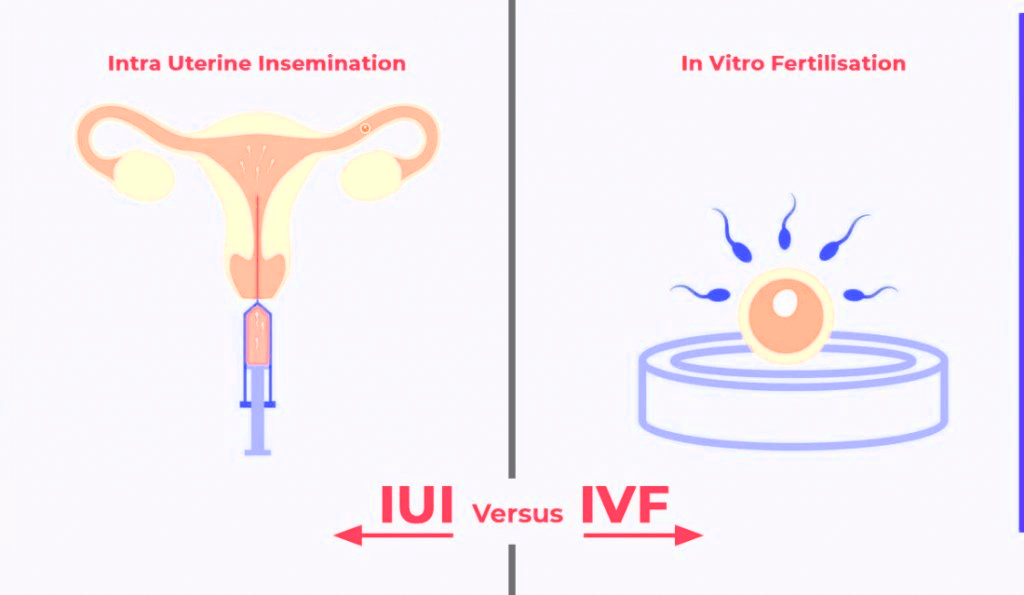Are you trying to conceive with no success? What is wrong? Getting pregnant naturally is not as easy as it used to be. So, you consult a gynaecologist for an opinion. And guess what? The couple is asked to undergo some tests after the doctor suggests that they undergo artificial fertility treatment: IVF or IUI. What are these, and how will they help you get pregnant? Let us explore.
Many couples require medical intervention to conceive. There are two artificial fertility treatments for childless couples: IUI (Intrauterine Insemination) and IVF (in vitro fertilization). When you are unable to get pregnant naturally, these two treatments do the trick. During IUI, sperm is injected directly into your uterus. IVF is a long treatment procedure where there are multiple steps involved: egg stimulation, retrieval, lab fertilization, and transfer. In case you need a donor sperm to get pregnant, then you need to undergo these medical treatments. For example, if you’re in a same-sex couple or want to become a single parent by choice.
Now that you know that you may get pregnant through IVF or IUI, let’s get going.
What is IUI?
In this procedure, sperm is placed directly into your uterus. This allows the sperm to reach your eggs directly and not travel to the uterus to reach the eggs. So, there are better chances of you getting pregnant. Here, a semen sample is washed to separate sperm from the seminal fluid, and then the entire sperm sample is injected directly into the uterus. The sperm reaching the uterus are also large in number. The procedure is done on the day after an ovulation surge and gets over in 5-10 minutes. Your doctor will insert a thin tube into your uterus to inject the sperm sample.
Sometimes, IUI (Intrauterine Insemination) is done along with ovulation induction, a process where you need to take medication to stimulate the development and release of eggs. For many people, the probability of conception is higher.
What is IVF?
IVF (in vitro fertilization) is a multi-step procedure. Normally, your ovaries produce just one follicle each month. However, if you’re undergoing IVF, you will be given a high dose of injectable hormone to produce multiple follicles. After these eggs mature, your doctor performs an outpatient surgical procedure to retrieve these eggs. These eggs are later combined with partner or donor sperm in the lab. Once these mature as embryos, they are either frozen or transferred to your uterus. To get more indepth knowledge about IVF checkout our Comprehensive Guide to IVF and its Treatment Options.
IVF or IUI which one is better for you?
Your doctor will decide which of these, IVF or IUI, will work for you. The causes of fertility need to be determined, the common ones being irregular ovulation, abnormal sperm, endometriosis and blocked fallopian tubes. Another thing your doctor will consider is your age, your health condition, your medical history, and your family’s medical history.
The treatment recommendation would be based on all the above factors.
When is IVF recommended?
If you have been through three or four unsuccessful IUIs, your doctor will recommend IVF. Also, if there are specific health conditions like endometriosis, multiple miscarriages, severe male-factor infertility, or blocked fallopian tubes that can’t be corrected with surgery.
Also, age and desire for a family are critical for going straight for IVF first.
Whether IVF or IUI, you must also keep in mind that any infertility treatment is not a guarantee of pregnancy. But they do increase your chances of getting pregnant. Also, either IUI or IVF may not result in pregnancy the first go itself. You might require multiple rounds of either of them to get pregnant.
FAQs
Is IUI 100% successful?
No. It has been observed that with each monthly attempt, the individual success rate for IUI is 15% to 20%. Doctors recommend attempting three to four rounds of IUI, which has a cumulative success rate of 40% to 50%.
Who is recommended for IUI?
Generally, IUI will be suggested by your doctor if you have unexplained infertility, no particular cause, or if your partner has mild male infertility issues.
IUI is less expensive than IVF and is also a less invasive procedure, which is why it’s often recommended as the first step.
What age is IVF most successful?
IVF is most successful for women in their 20s and early 30s. Once you reach your mid-thirties, the success rates will decline. Read More…
What are the minimum criteria for IUI?
At least one of the fallopian types must be healthy and normal
Ovarian reserve is good
Sperm quality is good
Women should be below 36 years of age.

